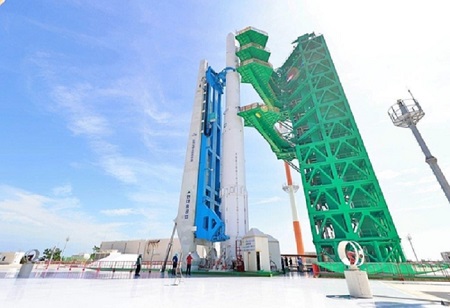South Korea is set to jumpstart its space programme on Thursday when it conducts the first test launch of its nationally built rocket.
The three-stage KSLV-II NURI rocket, emblazoned with South Korea’s flag and carrying a dummy satellite, is scheduled for blast-off at 4pm (07:00 GMT) from the Naro Space Centre, closely 500 kilometres (311 miles) south of Seoul.
The NURI, which means “world”, is designed to put 1.5-tonne payloads into orbit 600km to 800km (373 miles-497 miles) above the Earth and has been 10 years in development at a cost of 2 trillion won ($1.6bn).
The country has risen to develop the world’s 12th-largest economy and a technologically advanced nation but has lagged in the headline-making world of spaceflight, where the Soviet Union led the way with the first satellite launch in 1957, closely followed by the United States.
China, Japan and India all have advanced space programmes, and the South’s nuclear-armed neighbour North Korea put a 300-kg (660-pound) satellite into orbit in 2012 in what Western countries condemned as a disguised missile test.
Supervised by the Korea Aerospace Research Institute (KARI), the 200-tonne rocket was moved to its launch pad on Wednesday and raised into position.
“All preparations like umbilical connection and confidential inspection have been done,” the Ministry of Science and Technology said in a statement.
Space launches have long been a sensitive issue on the Korean Peninsula, where North Korea faces sanctions over its nuclear-armed ballistic missile programme.
South Korea’s future plans call for launching surveillance, navigation, and landing a lunar probe by 2030. The programme also consists of military satellites, but officials deny that the NURI has any use as a weapon itself.
Seoul’s space programme has a chequered record – its first two launches in 2009 and 2010, which in part used Russian technology, both ended in failure, the second one exploding two minutes into the flight.
The first successful launch was in 2013 and came after multiple delays and several failed tests. That rocket was also together developed with Russia.
Having its own launch vehicle will give South Korea the flexibility to determine payload types and launch schedules, and protect “confidential” payloads such as spy satellites, officials told in a report.
“Rockets are the only means available to mankind to go out into space,” Lee Sang-ryul, the director of the Korea Aerospace Research Institute, stated.
“Having such technology means we have fulfilled basic requirements to join this space exploration competition.”
The NURI weighs 200 tonnes, is 47.2 metres (155 feet) long, and is fitted with a total of six liquid-fuelled engines.
